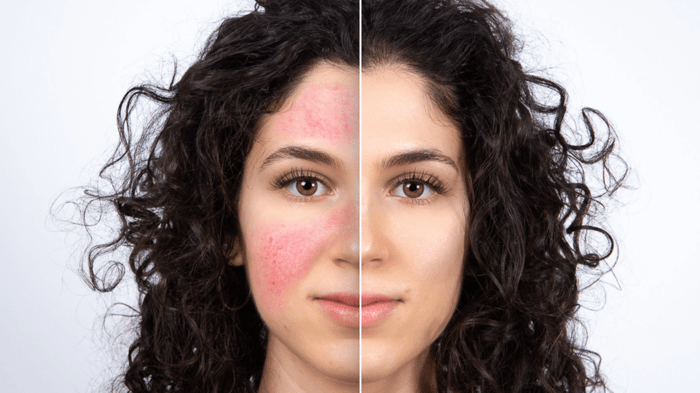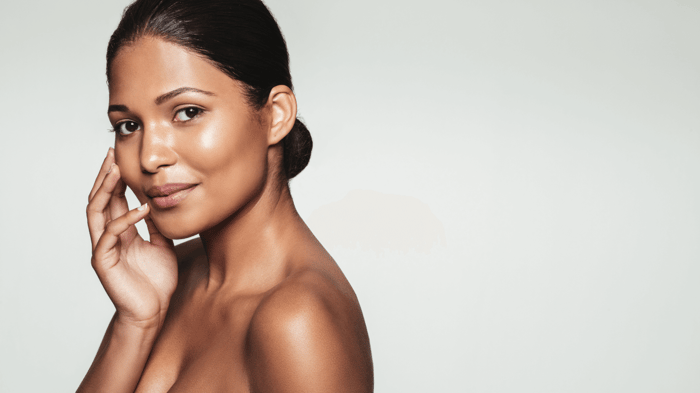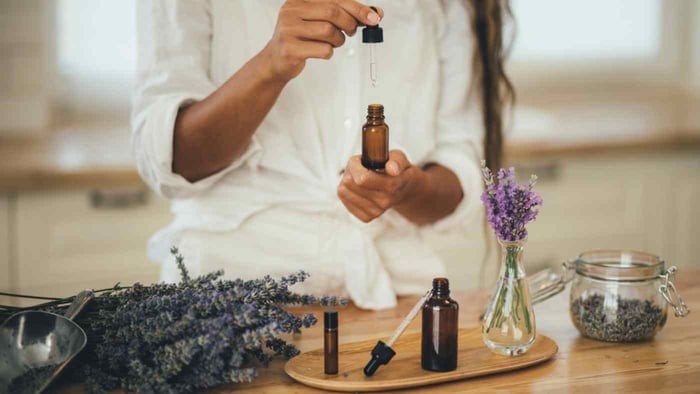Let's admit -- not many of us think about makeup ingredients. We really just think about the end result (a close-to-flawless face). But beauty does come at a cost, and this one could be to our health.
Why You Should Check Your Makeup Ingredients
Don't fall for beautiful ads and messaging that are common with beauty brands -- there are many companies that hide potentially harmful ingredients in their products, disguised with fancy names. Remember, you are applying these products to your largest organ -- your skin -- and these ingredients can absorb into your bloodstream with unhealthy effects.
Keep in mind there are more than 10,000 chemicals that can be added to makeup and skincare products, but the FDA has only banned 11 of them. That's right. Eleven. Out of 10,000-plus ingredients.
While serious side effects are rare, it's always better to be safe than sorry, and being aware of what you’re putting on your skin and what you’re breathing is an easy step to take. It's important to note that under the FDA Drug and Cosmetic Act, the FDA does not have to approve cosmetic products and ingredients before they go on the market.
Makeup Ingredients to Avoid

We know these ingredients are all extremely popular and for the most part deemed safe by the FDA, but if at all possible, try to avoid these seven makeup ingredients:
Talcum Powder
Talcum powder was a hot topic a few years go with the Johnson & Johnson lawsuits. Talcum powder is made from the mineral talc, which in its natural form, contains asbestos, a chemical that is known to cause cancer.
Talcum powder is widely added to cosmetics like powders for its ability to absorb moisture. Baby powder, facial powder, and deodorant are just three products from a list that includes talc.
Because of the asbestos that talcum powder contains, some worry the application of these products can cause cancer in babies and adults. Many women have already alleged that talcum powder led them to develop ovarian cancer.
Petroleum and Mineral Oil
The use of mineral oil has been a controversial topic for decades, regarding whether it is safe or not. It's a heavily processed petroleum product that is added to skin care products to keep skin moisturized. It forms a barrier that prevents skin from drying too much, so it's not really moisturizing in and of itself, but rather locking in moisture. To be used in cosmetics, mineral oil must be processed correctly in order to be safe for skin.
Lotions, skin creams, and sunscreens are a few products that contain mineral oil, and while it's considered overall safe, it can cause issues if it is poorly refined. Poorly processed mineral oil can contain polycyclic aromatic hydrocarbons, carcinogens that increase the risk of cancer.
If you must use a product with mineral or petroleum oil, make sure it includes white mineral oil, which is a highly purified and perfectly safe mineral oil.
Formaldehyde
Formaldehyde is found in shampoos, hair gels, nail polish, and more. Formaldehyde is a colorless gas, and in cosmetics, it is often a byproduct of other ingredients, making it formaldehyde-releasing preservative. If it is released as a byproduct, it is often not mentioned on the ingredient list.
This chemical can be linked to both allergic reactions in the skin and cancer after high exposure to it. When this carcinogen comes into contact with skin, it causes the germ cells to mutate and can become cancerous.
According to Campaign for Safe Cosmetics, formaldehyde is normally listed as one of these:
- Formaldehyde
- Quaternium-15
- DMDM hydantoin
- Imidazolidinyl urea
- Diazolidinyl urea
- Polyoxymethylene urea
- Sodium hydroxymethylglycinate
- 2-bromo-2-nitropropane-1,3-diol (bromopol)
- Glyoxal
Parabens
Parabens are some of the most widely used preservatives in cosmetics and are also found in conditioners, hair care products, lotion, and other skin care items. Since cosmetics are biodegradable, parabens added to prevent the growth of bacteria and mold, extending the product's shelf life.
Since parabens can be included in fragrance recipes, many products do not have them listed in their ingredients, leaving an estimated 75 to 90 percent of cosmetics which contain them. Parabens can easily soak into your skin and potentially lead to cancer and increased skin aging.
Silicones
Silicones are toxic to your body and its hormones, but are often added to cosmetics to give products a softer feel to them when applied. Silicone is made from silica, the main component of sand.
Silicones disturb your endocrine, disbalancing your body’s hormones and create a film over your skin, causing acne. This can also become difficult to remove from your skin when you want to. As harmful as they are to your skin care, they are also unhealthy for the environment, building up in the ecosystem.
Phthalates
Phthalates were actually developed in the past century to make plastic more durable, but can now be found in makeup products. Phthalates can commonly be found in nail polishes, shampoos, and hair sprays.
When in contact with phthalates in skin care products and makeup, they can cause harm when absorbed. In a study done in 2021, phthalates were found to affect the neurological, reproductive, and developmental systems.
Phthalates were also found to affect people of all ages and are dramatically detrimental to human health as found in clinical studies deeming them bad enough to be banned from makeup.
Fragrances
Fragrances are tricky because they aren’t one particular chemical. Still, it is common to simply see "fragrance" listed amongst product ingredients. Many of the elements listed under the term fragrances are unknown, but can be found in things like soap, shampoos, body wash, and deodorants.
Companies often consider fragrances as secret trade ingredients, therefore they aren’t required to release the list to the customers. They don’t need to ensure the safety of these fragrances either.
Fragrances can often contain many carcinogens which cause cancer, allergies which cause asthma, and endocrine disruptors. These mysterious fragrances often contain many elements in which lie various health issues, such as the ones listed in this article.
Our Favorite Clean Beauty Brands

If you want to avoid these toxic ingredients in some of the most common things in your life, make sure to check what you are buying and applying to your skin! There are many non-toxic brands that exist in the world, making sure that you get quality makeup and skin care without the dangers of chemicals and preservatives!
Here are some natural makeup and skin care brands that you can get without the worries of negative side effects:
-
Honest Beauty. A non-toxic makeup brand that is tested free from all negative chemicals that can affect your skin and health. With tons of products designed for all different types of skin, Honest Beauty is free from phthalates and sulfates too!
-
Alima Pure. Alima Pure is a brand that is free from so many types of chemicals that typically cause harm, such as: parabens, sulfates, phthalates, dimethicone, petroleum, talc, bismuth oxychloride, and nanoparticles. High quality, free of danger, and never tested on animals, a combination for the perfect kind of makeup you need.
-
Vapour Beauty. All the products at Vapour Beauty are made with a formula that is organic while being paraben and preservative free as well. This plant developed makeup is perfect for your morning routine.
-
Au Naturale. Specifically curated for sensitive skin, Au Naturale’s makeup is vegan, non-toxic, and cruelty free. This paraben free makeup is a great replacement for chemical filled products sitting on your shelf right now!
If you want to find healthy replacements for what is in your makeup bag right now, there are solutions in the healthy brands that craft cosmetics to be paraben and preservative free, even organic! Find makeup that makes you and your skin healthier.




